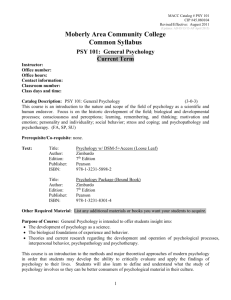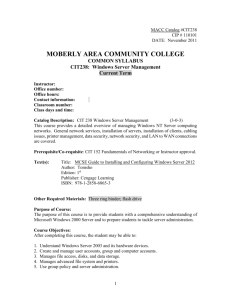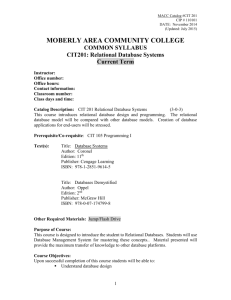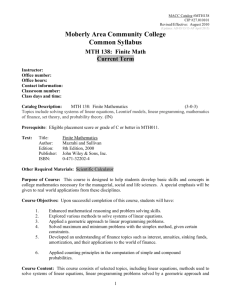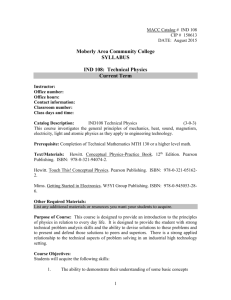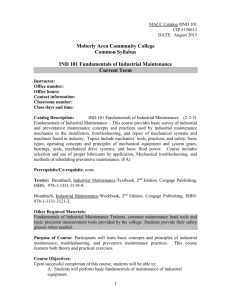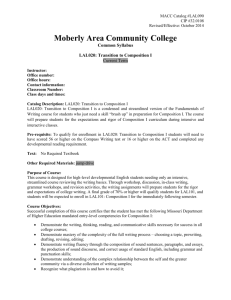PSY 230 Cross-Cultural Psychology
advertisement
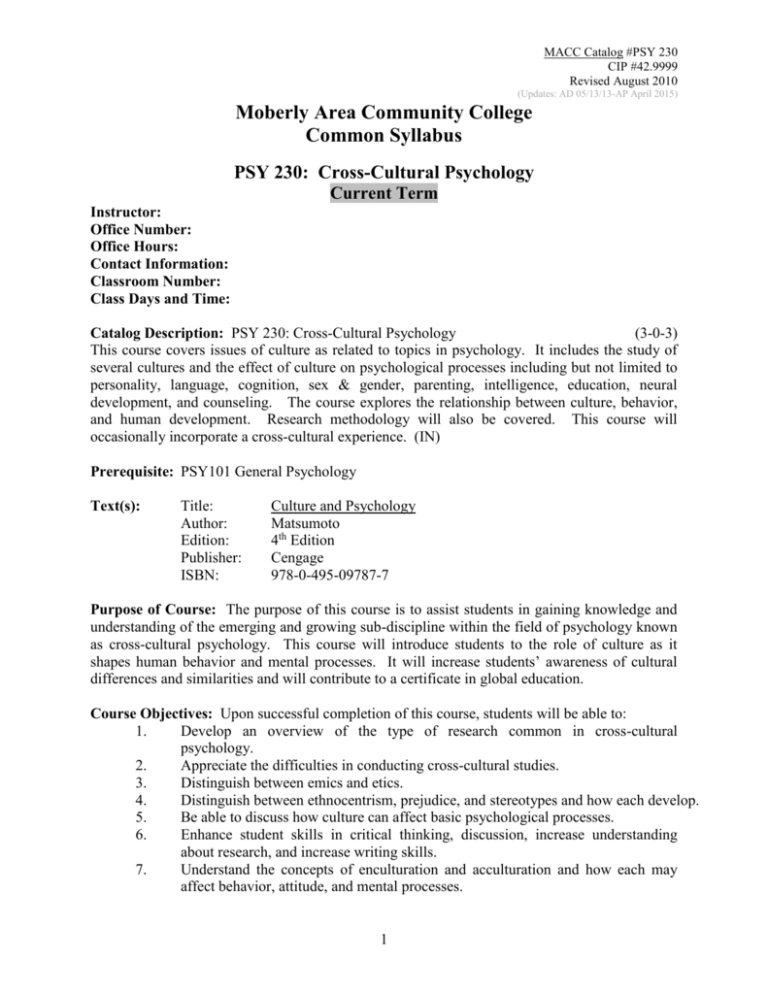
MACC Catalog #PSY 230 CIP #42.9999 Revised August 2010 (Updates: AD 05/13/13-AP April 2015) Moberly Area Community College Common Syllabus PSY 230: Cross-Cultural Psychology Current Term Instructor: Office Number: Office Hours: Contact Information: Classroom Number: Class Days and Time: Catalog Description: PSY 230: Cross-Cultural Psychology (3-0-3) This course covers issues of culture as related to topics in psychology. It includes the study of several cultures and the effect of culture on psychological processes including but not limited to personality, language, cognition, sex & gender, parenting, intelligence, education, neural development, and counseling. The course explores the relationship between culture, behavior, and human development. Research methodology will also be covered. This course will occasionally incorporate a cross-cultural experience. (IN) Prerequisite: PSY101 General Psychology Text(s): Title: Author: Edition: Publisher: ISBN: Culture and Psychology Matsumoto 4th Edition Cengage 978-0-495-09787-7 Purpose of Course: The purpose of this course is to assist students in gaining knowledge and understanding of the emerging and growing sub-discipline within the field of psychology known as cross-cultural psychology. This course will introduce students to the role of culture as it shapes human behavior and mental processes. It will increase students’ awareness of cultural differences and similarities and will contribute to a certificate in global education. Course Objectives: Upon successful completion of this course, students will be able to: 1. Develop an overview of the type of research common in cross-cultural psychology. 2. Appreciate the difficulties in conducting cross-cultural studies. 3. Distinguish between emics and etics. 4. Distinguish between ethnocentrism, prejudice, and stereotypes and how each develop. 5. Be able to discuss how culture can affect basic psychological processes. 6. Enhance student skills in critical thinking, discussion, increase understanding about research, and increase writing skills. 7. Understand the concepts of enculturation and acculturation and how each may affect behavior, attitude, and mental processes. 1 MACC Catalog #PSY 230 CIP #42.9999 Revised August 2010 (Updates: AD 05/13/13-AP April 2015) 8. 9. 10. 11. Develop an appreciation for the role of culture as it effects human development, gender, health, emotion, communication, personality, and psychological disorders and treatment. Provide critique of the field of cross-cultural psychology. Select a particular culture and compare and contrast it to the United States. The student will gain a richer understanding of cultural issues and appreciate the differences and similarities that exist across various cultures. Course Content: I. Introduction to cross-cultural psychology II. Defining Culture III. Methods of Research IV. Ethnocentrism, Prejudice, and Stereotypes V. Etics and Emics VI. Culture and Basic Psychological Processes VII. Enculturation and Acculturation VIII. Human Development Issues IX. Culture and Gender X. Culture and Health XI. Culture and Emotion XII. Culture and Communication XIII. Culture and Personality XIV. Culture, Psychopathology, and Treatment XV. A Critique of Cross-Cultural Psychology. Assessment of Student Learning: Describe how you plan to grade and what the requirements will be for the various letter grades. Also, describe the point values or percentages that assignments will be worth. The following provides one example. Since this course is being taught in conjunction with a trip abroad, most of the points will come from participation in the travel experience. Actually participating in another culture cannot be compared to simply talking about it in classroom. The student’s grade will be based on the following components: Travel Participation and Discussion and travel journal: Written Assignments: Post-Travel Project: Grade Scale 90 - 100% = A 80 - 89% = B 70 - 79% = C 60 - 69% = D 60% of total grade 20 % of total grade 20% of total grade 00 - 59% = F Description of Major Assignment(s) Projects(s): Per instructor’s Policy 1. As we travel, we will discuss various topics pertaining to cross-cultural psychology. Points will be awarded for participation in these discussions and for taking part in various cultural activities. 2 MACC Catalog #PSY 230 CIP #42.9999 Revised August 2010 (Updates: AD 05/13/13-AP April 2015) 2. Students are to keep a journal of their experiences while abroad. The instructor will also provide questions or topics to write about in the journal. Points will be awarded for keeping up in the journal and for group discussions pertaining to the journals. 3. Upon return home, the student will log onto the corresponding e-college site and engage in threaded discussions around topics the instructor will post. 4. Each student will write four brief papers (2-3 pages) on a topic assigned on the ecollege web site. These will be submitted electronically, graded, and returned electronically. 5. Each student will prepare a presentation about a topic they have chosen. A list of topics will be provided in a handout. The presentations will be made at the conclusion of the class when we will again meet face-to-face, summarize our experiences and share what was learned about cultural effects on human behavior and mental processes. Statement to Connect Course with General Education Outcomes or Technical Program Outcome Statement: In compliance with MACC’s General Education outcomes, the student who successfully completes this course will be able to: Demonstrate effective written and oral communication skills; Demonstrate knowledge of how history has shaped society and culture, understand how the individual relates to society and culture, appreciate cultural diversity, understand human behavior and mental processes, and understand human development. Instructor Policies: Academic Dishonesty: MACC board policy is as follows: “Academic dishonesty by students damages institutional credibility and unfairly jeopardizes honest students; therefore, it will not be tolerated in any form.” Forms of academic dishonesty include but are not limited to the following: violations of copyright law, plagiarism, fabrication, cheating, collusion, and other academic misconduct. Incidents of dishonesty regarding assignments, examinations, classroom/laboratory activities, and/or the submission of misleading or false information to the College will be treated seriously. The procedure for handling academic dishonesty is outlined in the Student Handbook (Policy Handbook M.010). In cases of alleged academic dishonesty, the burden of proof is on the student, not on the instructor. Attendance Policy: Any student who misses two consecutive weeks of class during a regular sixteen-week semester or the equivalent proportion of class time during a shorter session will be dropped from the class by the instructor unless acceptable justification is supplied. An instructor must complete and file the appropriate forms to drop the student within one week following the student’s violation of the attendance policy. Additionally, any student who misses more than one-fourth of the entire number of in-seat class meetings in a regular 16-week semester or the equivalent proportion of class time during a shorter session, may be dropped from that class by the instructor if, in the opinion of the instructor, the student does not have reasonable opportunity 3 MACC Catalog #PSY 230 CIP #42.9999 Revised August 2010 (Updates: AD 05/13/13-AP April 2015) to succeed in the class. A student’s attendance rate will be calculated based upon the first day of the semester (not the student’s date of enrollment in the course.) Student attendance must be defined in a different manner for online, hybrid, and virtual courses. Student attendance in these courses is defined as active participation in the course. Online, hybrid, and virtual courses will, at a minimum, have weekly mechanisms for student participation, such as any or all of the following methods: a. Completion of quizzes or exams b. Submission of assignments c. Participation in threaded discussions d. Communication with the instructor A student who does not participate in an online, hybrid, or virtual course for two consecutive weeks will be dropped by the instructor unless acceptable justification is supplied. An instructor must complete and file the appropriate forms to drop the student within one week following the student’s violation of the attendance policy. As with ground courses, a student’s attendance rate in online courses will also be calculated based upon the first day of the semester. If a student does not demonstrate active participation in the online course within the first two weeks (or the equivalent proportion of class time during a short session), the student will be dropped as “never attended.” Simply logging into an online class does not constitute active participation. Students should be aware that their dropping a course and their last date of attendance in the course may impact their financial aid. (Policy Handbook I.090 and M.095) However, because this course is centered around a trip abroad, attendance expectations will be met by participating on the trip, by participating in web-based discussions once we have arrived home, and attending the “wrap-up” session at the conclusion of the class. Tardiness: Per instructor’s policy Make-up and late work: Extra-Credit Work: Per instructor’s policy Per instructor’s policy Per instructor’s policy Schedule of Student Assignments/Activities: ADA Statement Students who have disabilities that qualify under the Americans with Disabilities Act may register for assistance through the Office of Access and ADA Services. Students are invited to contact the Access Office to confidentially discuss disability information, academic accommodations, appropriate documentation and procedures. For more information, please call either the Moberly office at (660) 263-4100 x11240 or the Columbia office at (573) 2341067 x12120, or visit our web page at http://www.macc.edu/index.php/services/access-office. 4 MACC Catalog #PSY 230 CIP #42.9999 Revised August 2010 (Updates: AD 05/13/13-AP April 2015) Title IX Statement MACC maintains a strict policy prohibiting sexual misconduct in any form, including sexual harassment, sexual discrimination, and sexual violence. All MACC employees, including faculty members, are considered mandated reporters of sexual misconduct and as such are expected to contact the Title IX Coordinator when they become aware, in conversation or in writing, of an incident of sexual misconduct. For more information on this policy or to learn about support resources, please see http://www.macc.edu/sexual-misconduct-policy or contact Dr. Jackie Fischer, MACC’s Title IX Coordinator, at 660-263-4110, ext. 11236 or jackief@macc.edu. 5



